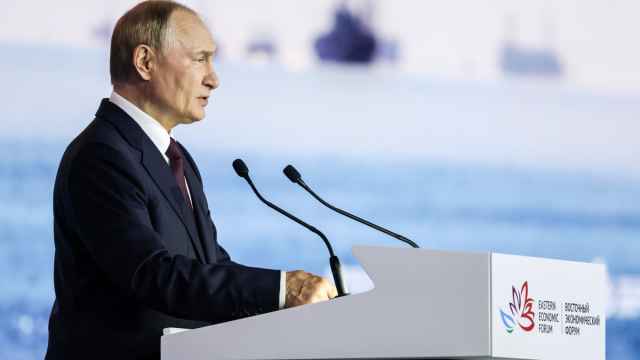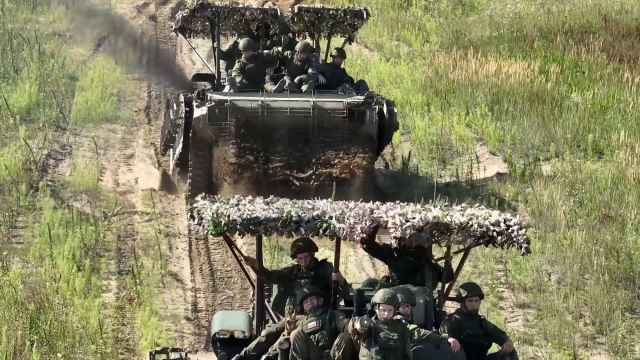The government banned exports of refined petroleum products Thursday, as the country grapples with fuel shortages in several regions.
"I think that in May we must satisfy our own demand with the help of export cutbacks. As of today we have made an agreement that oil companies will deliver all volumes [of gasoline] to the domestic market," Deputy Energy Minister Sergei Kudryashov said at an emergency meeting with oil companies.
The Energy Ministry and several major oil firms agreed at the meeting to "completely halt" exports of refined oil products in May.
Gasoline prices are not likely to increase by more than 5 percent in the medium term, Kudryashov told journalists after the meeting.
Russia exported only about three million tons of refined oil products in 2010 — a fraction of total oil and gas exports, which are mostly made up of unrefined products.
Officials have reported scenes of "panic" at filling stations in the Tomsk, Belgorod and Voronezh regions in western Russia, which have been hardest hit by gasoline shortages.
Kudryashov said the Belgorod region is the worst hit. Officials from the region revealed Thursday that Rosneft had temporarily imposed fuel rationing at its stations in April, limiting sales of gasoline to 20 liters per vehicle.
Shortages have been building since Prime Minister Putin told oil firms in February to restrain retail prices. The situation came to a head last weekend, when almost all independently owned gas stations in the Altai region, on the border with Kazakhstan and Mongolia, ran out of fuel.
The Energy Ministry said in a statement Thursday that supplies had been restored in the Altai region, but shortages have also been felt in Lipetsk, Kemerovo and Tula, where supplies of high octane gasoline are down to three to five days, the ministry said.
Other affected regions include Novosibirsk and Sakhalin. Interfax reported that some fuel blends had begun to run out in Smolensk on Thursday.
Oil companies have blamed the shortages on government support for car sales, which resulted in a boom of 1.91 million units sold in 2010, up 30 percent on 2009, and a simultaneous policy of suppressing gasoline retail prices.
LUKoil vice president Leonid Fedun said in comments posted on the company's web site Wednesday that the "stocks have been eroded not because of exports, but because of high demand."
He said the government's successful cash-for-clunkers program — introduced to help the auto industry recover from a 50 percent crash in sales in 2009 — "threw millions of cars onto the market that want gasoline."
But Kudryashov said at a Cabinet meeting attended by Prime Minister Vladimir Putin on Thursday that the export of high-octane gasoline had gone up 67 percent, causing the deficit on the home market.
In response, Putin told Kudryashov to prepare a decree to hike export customs duties by the end of the day Thursday.
Putin's spokesman Dmitry Peskov following the cabinet ministry briefing also said that, starting May 1, export duties on gasoline would increase.
"[Putin] meant gasoline. By the end of the day, concrete instructions [on the increase of duties] will be given."
Putin said Kudryashov had some explaining to do as to why the world's largest oil producer has problems with gasoline.
"Last year we produced 505 million tons of oil — more than Saudi Arabia. So we cannot be experiencing any shortages. I am asking you to look into it carefully," he told Kudryashov.
Kudryashov also said that not all Russian producers were prepared to make the switch to a more modern emissions standard, Euro 3, originally scheduled for Jan. 1 of this year.
Putin asked ministers to keep the switch to Euro 3 on track and coordinate the move with fellow customs union members Belarus and Kazakhstan.
Putin also tried to appease the oil companies, asking Kudryashov at the Cabinet session to look into ways of lowering the tax burden on oil companies and fixing gasoline shortages in Russian regions.
"I'm asking the Energy Ministry together with the Finance Ministry to look at the possible adjustment of the tax burden on the oil industry — the adjustment might be related to lowering the natural resource extraction tax or excises," Putin said.
Peskov could not clarify when the lowering of the tax burden — either of the natural resource extraction tax or excise — would take place. "Probably it will happen in 2012. But in theory it's possible it will happen earlier. I cannot say for sure," Peskov said.
Meanwhile, Liberal Democratic Party leader Vladimir Zhirinovsky has called for the oil industry to be nationalized to curb price fluctuations.
"Oil companies set excessive prices on various gasoline brands, which harms our consumers," the party press office on Thursday quoted Zhirinovsky as saying.
"If there is no stabilization, the Liberal Democratic party will submit a law on nationalization of the oil industry to the State Duma. The government must curb the growth of petroleum product prices, especially in the spring sowing period," he said.
A Message from The Moscow Times:
Dear readers,
We are facing unprecedented challenges. Russia's Prosecutor General's Office has designated The Moscow Times as an "undesirable" organization, criminalizing our work and putting our staff at risk of prosecution. This follows our earlier unjust labeling as a "foreign agent."
These actions are direct attempts to silence independent journalism in Russia. The authorities claim our work "discredits the decisions of the Russian leadership." We see things differently: we strive to provide accurate, unbiased reporting on Russia.
We, the journalists of The Moscow Times, refuse to be silenced. But to continue our work, we need your help.
Your support, no matter how small, makes a world of difference. If you can, please support us monthly starting from just $2. It's quick to set up, and every contribution makes a significant impact.
By supporting The Moscow Times, you're defending open, independent journalism in the face of repression. Thank you for standing with us.
Remind me later.





